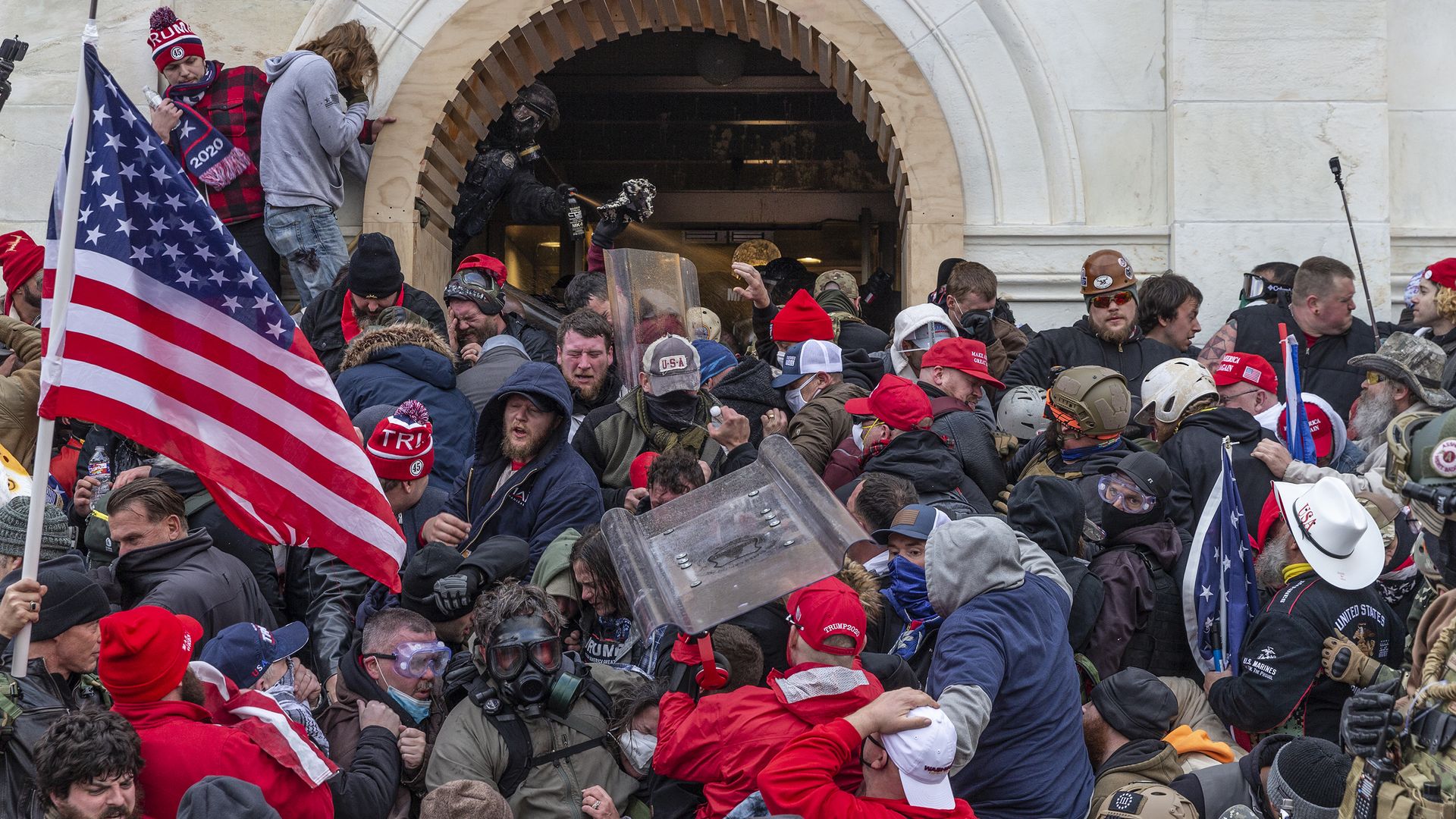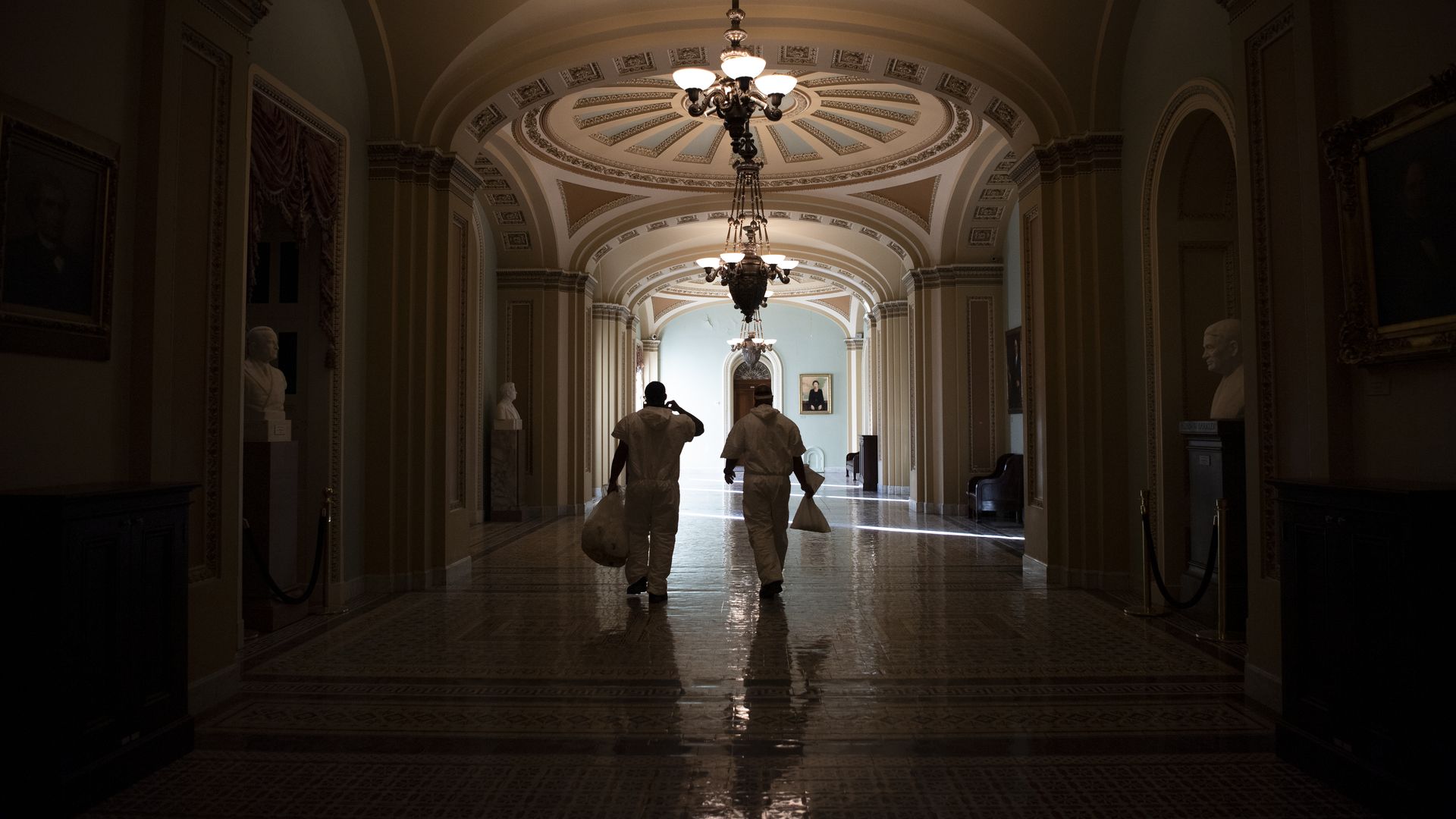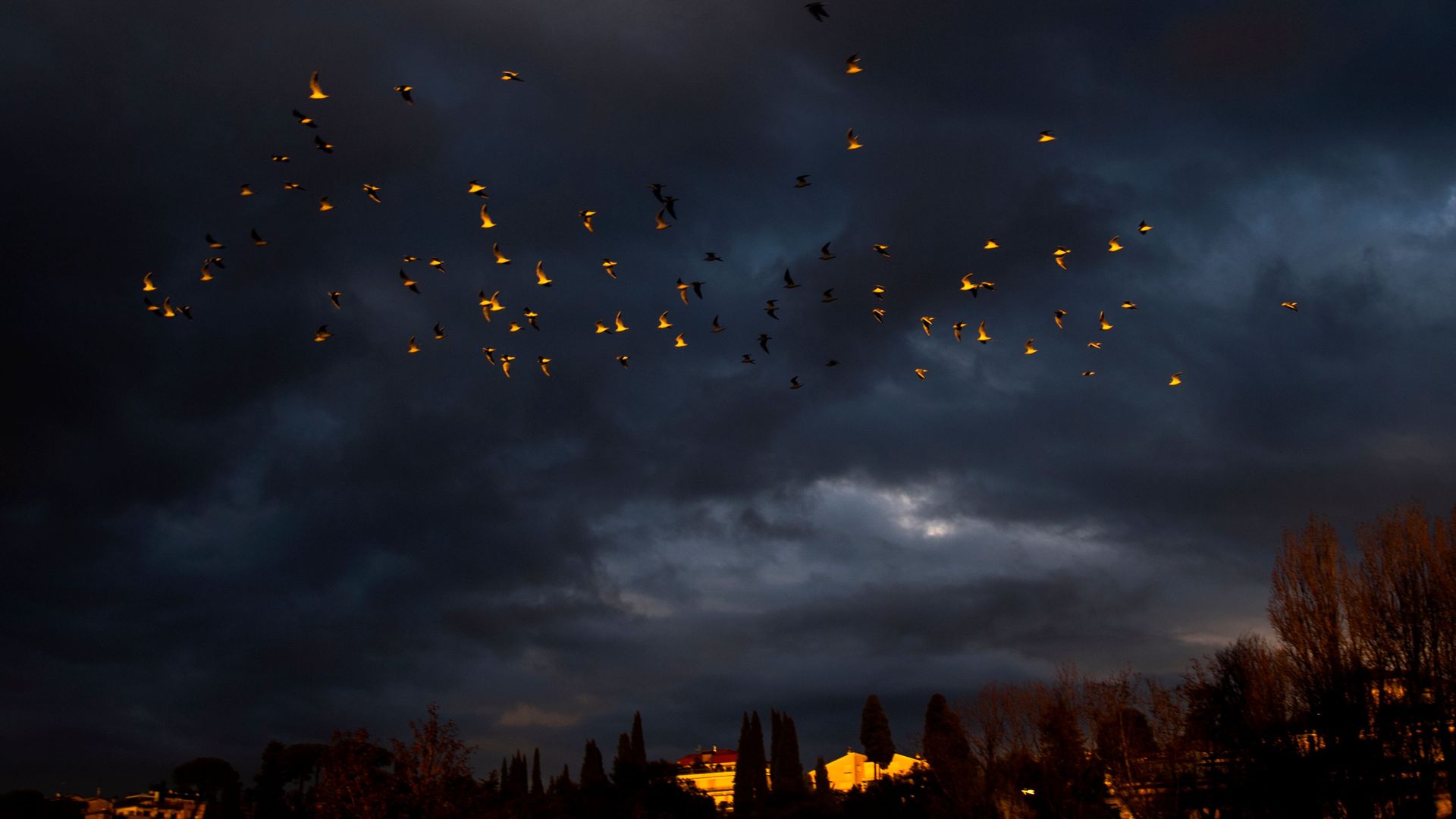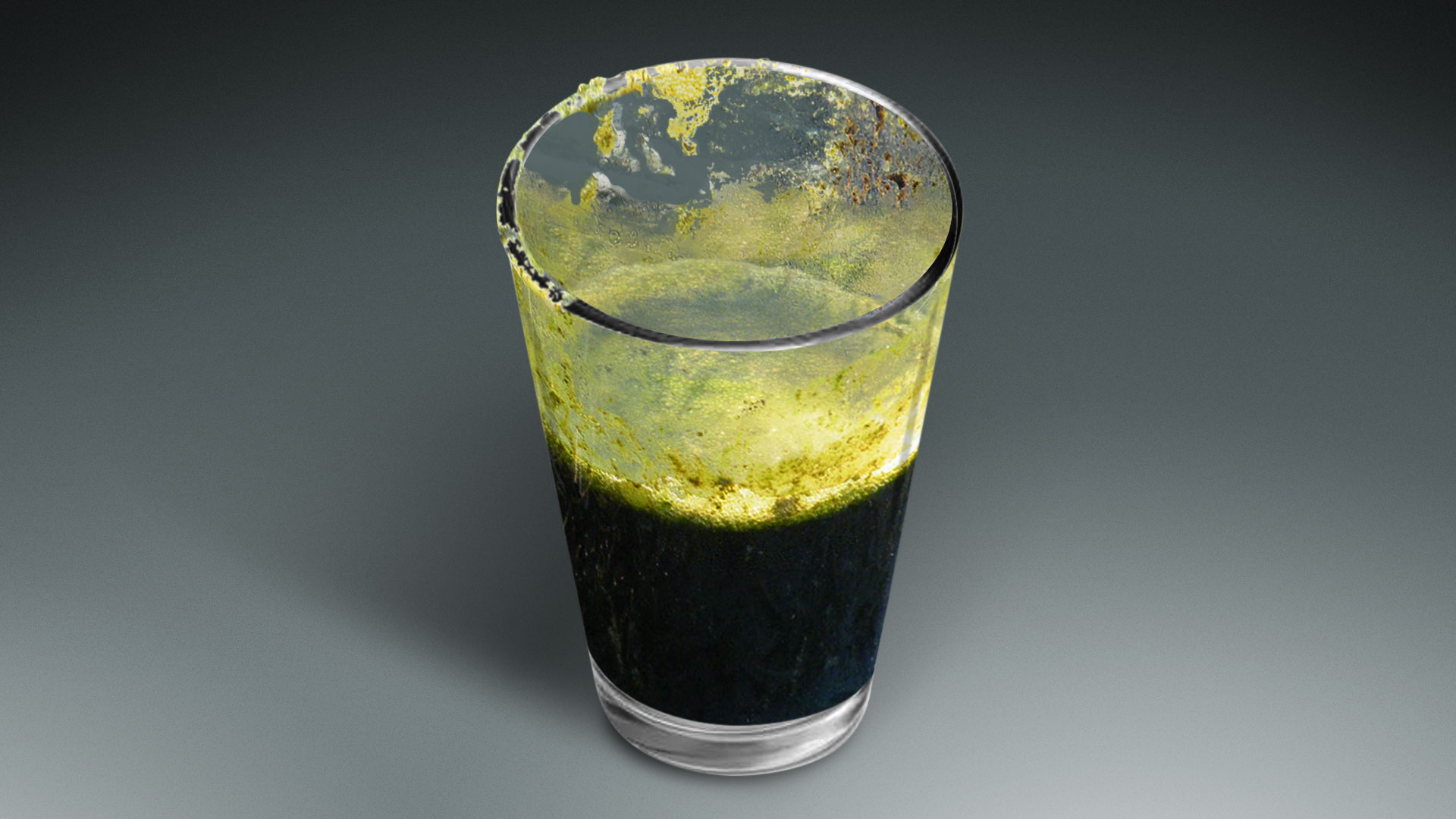| | | | | | | Presented By OurCrowd | | | | Axios World | | By Dave Lawler ·Jan 07, 2021 | | Welcome back to Axios World. Tonight's edition feels a bit different, as the events that much of the world is reacting to tonight happened right up the road, at the U.S. Capitol. - For an international perspective on the Capitol chaos, we have a special contribution from Nadav Eyal, the author of a recent book on the global rise of nationalism.
- I also take a look at America's global image at this time of transition, track the purchases of the Russian and Chinese vaccines, and more (1,898 words, 7 minutes).
New arrival? Sign up here. | | | | | | 1 big thing: Biden inherits a world wary of America |  President-elect Biden declared during the siege of the U.S. Capitol on Wednesday that "the world is watching." Indeed, the world was watching long before yesterday. Why it matters: Biden has made restoring America's global image, leadership and alliances the cornerstone of his foreign policy agenda. That was a tall order even before audiences around the world watched a mob forcefully disrupt America's democratic process. By the numbers: A Pew survey conducted in July — in the midst of the pandemic, racial justice protests and the U.S. election campaign — found that across 13 allied countries, a median of just 34% said they viewed the U.S. positively. - In nearly every country, those numbers had fallen precipitously from 2019, when majorities in most of the countries viewed Trump negatively, but not America itself.
- In Japan, 68% of respondents viewed the U.S. favorably as of 2019, a number that had held fairly steady for a decade. This year, it fell to 41%. The falls were nearly as sharp in countries like South Korea (77% to 59%) and Australia (50% to 33%).
- Back in 2015, a median of 68% in Pew's poll viewed the U.S. favorably.
Breaking it down: Those numbers aren't just a reflection of antipathy to Trump, though his global favorability ratings are strikingly low (19% in the U.K., for example). - Majorities in most countries believe the U.S. had done a "very bad" job handling the pandemic. A median of just 15% across the 13 countries felt the U.S. response was "somewhat" or "very" good.
- Another Pew poll found a sharp decline in the belief that the U.S. "respects the personal freedoms of its people."
- Meanwhile, a Gallup poll of 135 countries conducted in late 2019/early 2020 (before the pandemic) found virtually identical rates of approval for U.S. (median of 33%), Chinese (32%) and Russian (30%) global leadership.
Flashback: The Pew and Gallup polls both go back far enough to highlight another time when global views of the U.S. plummeted dramatically: in 2003, following the invasion of Iraq. - In several allied countries, views of U.S. leadership were equivalent to or lower then than they are today.
- Those ratings remained relatively low throughout Bush's tenure and then shot upward amid global enthusiasm around the election of Barack Obama.
What to watch: Now another president is taking office promising to restore America's standing. - Biden is unlikely to be greeted with the immediate surge of pro-U.S. sentiment that surrounded Obama.
- For the time being, global attention is focused far more closely on the president who is leaving than the man who is about to replace him.
|     | | | | | | 2. What they're saying: World leaders condemn Trump |  | | | Police use tear gas to stop push back rioters after the Capitol was breached. Photo: Lev Radin/Pacific Press/LightRocket via Getty | | | | Most leaders of the world's major democracies were quick to condemn the violence at the Capitol, including some like Indian Prime Minister Narendra Modi, who previously had only praise for Trump. Some have even directly condemned Trump's actions, including U.K. Prime Minister Boris Johnson today. "All my life America has stood for some very important things — an idea of freedom and an idea of democracy. … insofar as he encouraged people to storm the Capitol and insofar as the President has consistently cast doubt on the outcome of a free and fair election, I believe that that was completely wrong." — Boris Johnson German Chancellor Angela Merkel said the events made her "furious." "Unfortunately, President Trump did not accept his defeat since November, not even yesterday, and that has naturally created an environment that enabled such violent events." — Angela Merkel There were exceptions. In a video posted to social media, Brazilian President Jair Bolsonaro said he continues to believe there was "fraud" in the U.S. election, and he defended Trump's actions. "I followed everything today. You know I'm connected to Trump, right? So you already know my answer." — Jair Bolsonaro Mexican President Andrés Manuel López Obrador also declined to criticize Trump or condemn the violence, calling the scenes at the Capitol an internal U.S. matter. - But he did criticize Twitter and Facebook for blocking Trump's accounts, saying, "I don't like censorship."
|     | | | | | | Expert Voices | | 3. The global view: The damage will outlast Trump |  | | | Cleaning up after the riot. Photo: Caroline Brehman/CQ-Roll Call via Getty | | | | While Americans lament the cracks in American democracy and President Trump's disastrous COVID-19 response, world leaders observe something of global consequence: the growing instability of a weakening superpower. There will be a price to pay, Nadav Eyal writes for Axios. What they're saying: "What we saw in the United States yesterday evening and today shows above all how fragile and vulnerable Western democracy is," gloated Iranian President Hassan Rouhani. - "America no longer charts the course and so has lost all right to set it — and, even more so, to impose it on others," said Konstantin Kosachyov, chair of the foreign affairs committee in Russia's upper house.
Why it matters: While some Americans might see a silver lining in this week's events — a Republican establishment deserting Trump, himself now tainted with a violent attempt to obstruct the orderly transition of power — in most countries the story is painted with a broader brush. - America is seen as weak, failing in its COVID-19 response, unable to protect its own Congress and awash with political charlatans and militia violence.
Whether or not this is an accurate description is not important. - Four years of Trump have cast an existential doubt on America's strength, which will breed miscalculations, tension and conflict.
- The Biden administration will need to work long and hard to restore U.S. deterrence and prestige.
- The Trump administration has not only alienated American allies and encouraged China and Russia, it has signaled to many that the liberal order is beyond repair.
The big picture: The world is witnessing a global revolt, targeting power structures seen as hollow, corrupt or unrepresentative. That revolt is more about destroying current power structures than the fine details of building new ones. Democracies are especially vulnerable. Describing what happened on Capitol Hill as a "mob," "populism" or even "terrorism" simply doesn't cut it. - It disregards global context, from Brexit to the rise of Hindu nationalism.
- It fails to see that the growing resistance to the current world order is not a passing problem, a bump in the road, but a new status quo.
- It fantasizes about erasing the Trump years, instead of seeing them for what they are: the omens of a new age.
Nadav Eyal is an Israeli journalist and the author of "REVOLT: The Worldwide Uprising Against Globalization," published January 2021 by Ecco (HarperCollins). |     | | | | | | A message from OurCrowd | | Proven tech could save governments billions treating drinking water | | |  | | | | Toxic algae blooms are poisoning water supplies globally. BlueGreen Water Technologies treats toxic algae fast, effectively and at scale. Proven across five continents, BlueGreen could save billions. Now, you can invest. Explore BlueGreen's ability to save our drinking water. | | | | | | 4. Who's buying the Russian and Chinese vaccines? |  Data: Axios research; Graphic: Andrew Witherspoon/Axios Serbia joined Argentina, Belarus and Russia this week to be among the first countries to approve and administer Russia's Sputnik V vaccine. The big picture: Russia has blazed its own course in the vaccine race, relying entirely on a single, state-funded vaccine that was given emergency authorization before much data was available about its effectiveness. - The vaccine's developers say it has a 91% efficacy rate, though that's yet to be confirmed by a medical journal or international regulator.
Now, Russia is seeking to vaccinate its population while also exporting doses around the world. The government says 1 million Russians have been vaccinated, but it has fallen far behind the number of doses it promised to deliver to cities and regions by now, per the WSJ. - German Chancellor Angela Merkel told Vladimir Putin on Wednesday that she is open to manufacturing doses of the vaccine in Germany, if it's approved by EU health regulators.
- But a Hungarian government spokesman said last week that Hungary was no longer planning to rely on the Sputnik vaccine due to Russia's "inadequate manufacturing capacity" — instead focusing on vaccines provided by the EU and sourced from another world power: China.
State of play: Health regulators in China recently approved the country's first homegrown vaccine, developed by the state-owned pharmaceutical company Sinopharm, for general use. - The UAE, Bahrain, Pakistan and Morocco are among those slated to receive Sinopharm doses, while Turkey, Indonesia and Brazil have preordered a vaccine developed by another Chinese company called Sinovac Biotech.
- Regulators in Brazil announced today that the Sinopharm vaccine is 78% effective, roughly matching findings announced by the company.
What to watch: If China's vaccines prove effective — and the country can manufacture sufficient quantities to cover domestic needs and significant exports to the developing world — that could markedly improve the outlook for global vaccination in the coming years. It could also offer China a significant soft power boost. Go deeper: |     | | | | | | 5. Global news roundup |  Data: Our World in Data; Chart: Axios Visuals 1. Several European countries, including Germany and the U.K., have elected to close schools as part of their new, strict lockdowns amid a brutal third wave of the coronavirus. - Nearly all European countries decided to keep schools open when they entered partial lockdowns during the fall wave.
- Flashback: Western Europe had seemed to turn the tide just a few weeks ago, as their rates of new cases fell swiftly following the new lockdown measures. Now cases are rising precipitously across the continent, and exploding in cities including London.
2. WHO director-general Tedros Adhanom Ghebreyesus admonished China on Tuesday for delaying authorization that would allow groups of scientists from other countries to investigate the origins of the novel coronavirus in Wuhan, Axios' Orion Rummler writes. - It took nearly a year for China to agree to WHO involvement in an investigation into coronavirus origins. Now, China has denied a WHO team access to the country.
3. Hong Kong authorities arrested more than 50 pro-democracy activists and politicians yesterday who participated in primary elections last year, charging them with "subverting state power" under the national security law that China forced on the city last year. - The big picture: The arrests indicate Chinese Communist Party leaders see any form of true participatory government as an illegitimate subversion of their power, Axios' Bethany Allen-Ebrahimian writes.
- The arrests also suggest Beijing believes it will face no meaningful resistance from Western countries. China enters 2021 as the only major economy that experienced significant growth in 2020 amid the coronavirus pandemic.
4. Prime Minister Benjamin Netanyahu is demanding full control of Israel's Iran policy as Joe Biden prepares to assume the Oval Office, setting off a fierce fight at the highest echelons of Israel's government, senior Israeli officials tell Axios' Barak Ravid. - Why it matters: Prime Minister Benjamin Netanyahu is preparing to take a very hard line over Biden's plan to return to the 2015 nuclear deal, in contrast with the more moderate approach favored by Defense Minister Benny Gantz, Foreign Minister Gabi Ashkenazi and the heads of Israel's security services.
- Go deeper
|     | | | | | | 6. What I'm reading: Life among the wreckage |  | | | Churchill inspects the damage in South London, September 1940. Photo: Reg Speller/Fox Photos/Hulton Archive/Getty | | | | Last night I shut off the TV, logged off Twitter and delved into 1941 London, where the Blitz was raging and life, somehow, went on. I was finishing up Erik Larson's "The Splendid and the Vile," which takes place during Winston Churchill's first year as prime minister — with France on the verge of defeat and an air war beginning over Britain. Churchill's primary objectives in this period were to gird the British people for a fight (Hitler expected the country to turn on Churchill and sue for peace), to pull America into the war (Roosevelt was sympathetic to the cause but attuned to the more isolationist impulses of the public and Congress), to prepare for a German invasion, and to manufacture and deploy the aircraft needed to fend the Germans off. - That final objective plays a prominent role in Larson's book, and it reminded me of the current effort to manufacture and distribute vaccines.
- Most illuminating, though, are the frequent excerpts from diary entries — both from those in Churchill's orbit and from ordinary Brits enduring the Blitz.
- As bombs fell and the flame of Western democracy flickered, people worked, danced, suffered, fell in love, put out fires and tried to catch a few hours of sleep.
I was slightly skeptical of "another Churchill book" but quickly felt as though I'd picked this one up at just the right time. |     | | | | | | 7. Stories we're watching |  | | | Seagulls fly over Rome. Photo: Tiziana Fabi/AFP via Getty | | | - Russia's SolarWinds hackers likely burrowed deep
- China flexes muscles with U.S. in chaos
- Trump uses private companies to ratchet up economic pressure on China
- Forced labor in Xinjiang is bigger than we knew
- Israel tightens COVID-19 lockdown
- Debating the origins of COVID-19
- Netanyahu aides fret "Obama people" will shape Biden's Iran policy
Quoted: "Last year, President Trump extended painful economic sanctions placed on Zimbabwe, citing concerns about Zimbabwe's democracy. Yesterday's events showed that the U.S. has no moral right to punish another nation under the guise of upholding democracy. These sanctions must end." — President Emmerson Mnangagwa of Zimbabwe |     | | | | | | A message from OurCrowd | | BlueGreen's innovative WaterTech could prevent global disaster | | |  | | | | Toxic algae blooms are expanding rapidly, poisoning our drinking water and causing billions of dollars in damage. BlueGreen Water Technologies has been proven in reservoirs, lakes and rivers all over the world to eliminate toxic algae. Invest early as BlueGreen helps save our drinking water. | | | | | | Axios thanks our partners for supporting our newsletters.
Sponsorship has no influence on editorial content. Axios, 3100 Clarendon Blvd, Suite 1300, Arlington VA 22201 | | | You received this email because you signed up for newsletters from Axios.
Change your preferences or unsubscribe here. | | | Was this email forwarded to you?
Sign up now to get Axios in your inbox. | | | | Follow Axios on social media:    | | | | | |











No comments:
Post a Comment